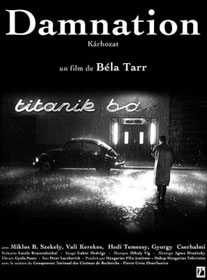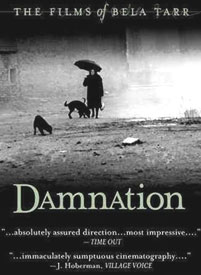 Lugubrious pacing makes Damnation (Karhozat, 1988) difficult to sit through. But the attempt really must be made.
Lugubrious pacing makes Damnation (Karhozat, 1988) difficult to sit through. But the attempt really must be made.
It's one of those films that almost requires the viewer to be trapped inside a movie house not wanting to waste one's money by walking out. It will nowadays almost always be viewed on dvd.
Without special interest in Hungarian cinema or in director Bela Tarr, a lot of viewers will find it too easy to turn it off, go make a sandwich, & just never watch the rest of it.
And that's too damned bad. The black & white cinematography of Tarr's first feature film is pure art, & patience will reward any viewer who had the temerity to attempt the viewing in the first place.
An ugly, ugly town beautifully photographed is populated by people with rough, strong features which the cameras adore.
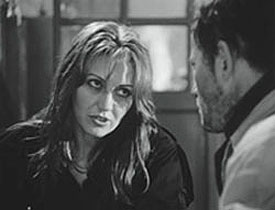 It's almost always raining & even if the rain stops now & then, the world is wet, muddy, overcast, & depressing, in accord with the emotions of the local residents. It's almost always raining & even if the rain stops now & then, the world is wet, muddy, overcast, & depressing, in accord with the emotions of the local residents.
Karrer (Miklos Szekely B.), without family, with a drinking problem, & nothing left to lose, is offered a courier job that sounds either dangerous or criminal, & likely both.
He can't decide whether or not to do it, as he feels somehow bound to the town & not ready to leave.
Everyone seems to live in darkness, moving in slow motion through a terrible dream. A local bar attempts to be a jazz club, with the unsettling name Titanik.
Karrer is in love with the singer (Vali Kerekes), or obsessed with her at any rate, though she's married. For this obsession, Karrer is trapped in a crummy triangle of deceit & loathing.
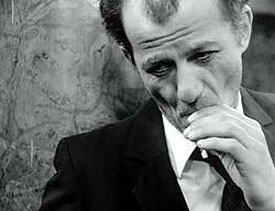 He considers passing the courier job on to her husband, to get rid of him. We can see so many possibilities for where this could go as a plotted thriller, but plot is not Bela Tarr's consideration. He considers passing the courier job on to her husband, to get rid of him. We can see so many possibilities for where this could go as a plotted thriller, but plot is not Bela Tarr's consideration.
Vague elements of genre fiction are used to reveal other things about character, depression, the fear that life is meaningless & we are all lost in limbo, not quite a surrealist tale but one that requires us to feel something rather than resolve something.
Karrer hangs out at the bar to be near her. When she sings, it goes well beyond torch song & expresses the deepest gloominess.
HEr song is the world's most tragic blues, a song of doomful asceticism. It might easily have been sung in a David Lynchian universe inside an eraserhead.
The director has a sure eye for revolting architecture & deplorable objects which are nevertheless worthy of photography.
An actual plot never quite develops, though little bits & hints of plot keep the mind trying to make sense of all the mutual spying going on, & peculiar dialogue weighty with apparent meaning that never quite comes clear.
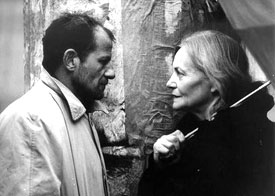 In this world that hints of existential chaos, half-feral dogs wander the dismal streets & outskirts of the town. In this world that hints of existential chaos, half-feral dogs wander the dismal streets & outskirts of the town.
Our anti-hero's final prancing, dancing, crawling encounter in the mud with such a dog is the dans macabre that assures the viewer than humanity's affinity for the Beast is only because we are ourselves bestial.
When this typically long sequence begins, I was so wrapped up in the awesome filthy beauty of it that I was thinking, "My god, I'd end the film here, Tarr will never achieve a moment greater than this!"
It's a great movie & really too bad it is "not for everyone" because humanity would be a great deal more significant than it is if we were all likely to embrace foremost the art of a thing, with rather few of us preferring to be given a fast-paced rollercoaster ride to authentic artistry.
copyright © by Paghat the Ratgirl
|
